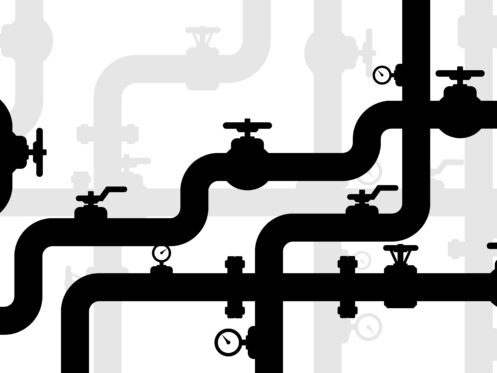Leaks are among the most troublesome plumbing and HVAC issues you can encounter as a homeowner. They can be difficult to locate and sometimes even confirm. Plus, even small leaks can cost you a lot of money and develop into even bigger problems down the line. If you’re dealing with a leak or suspect that you are, it’s important to call in the professionals right away. Let’s explore how a plumber or HVAC technician is going to help you find and fix your leak.
HVAC Leaks
There are two main types of leaks when it comes to HVAC systems: water and refrigerant. There are various tests available to an HVAC technician. The first step is to perform a comprehensive inspection and evaluate how the HVAC troubles have manifested. From there, the technician can isolate potentially faulty components and determine which test or tests to employ.
HVAC Water Leaks
You don’t normally need advanced equipment or techniques to find HVAC water leaks. Furnaces don’t leak except in the case of a faulty furnace humidifier. Boilers leak either from the valves or the tank itself. Air conditioners and heat pumps are the main culprits when it comes to HVAC water leaks. Even they are generally easy to identify. These leaks are typically due to the condensation created through cooling. This issue is almost always related to the drip pan, wet switch or condensate drain line.
HVAC Refrigerant Leaks
If a technician suspects a refrigerant leak, the leak is often easy to identify without testing. In some cases, there will be ponding refrigerant, but it doesn’t even have to be that obvious. Oil is a component of refrigerant coolant to serve as a lubricant for the compressor. If there is any degree of leakage, oil spotting may be visible near the HVAC equipment or on tubes or joints. In the case of an evaporator coil, you can often tell by the smell or fluids in the drip pan. Turn to our team for any HVAC repair solutions!
Bubble or Dunk Testing
A bubble or dunk test is the most basic HVAC leak test. It’s quick and simple but only applicable to relatively large leaks. Once a technician has identified a potentially leaking part, they’ll fill it with either air or gas. The next step is to submerge it in water and watch for bubbles. If bubbles rise up from the part into the water, you have a leak. The technician then either needs to reseal or replace that component.
Electronic Leak Detection
The most common way to detect non-obvious refrigerant leaks is with a handheld electronic leak detector. There are several varieties: infrared, ultrasonic and heated diode or heated electrolyte. Ultrasonic devices detect the hiss from the leaking gas. Infrared devices work by the refrigerant absorbing the light, which reveals the leak. Heater diode and electrolyte heat up the gas in the refrigerant to break the molecules apart. It can then detect the presence of molecules that indicate a leak.
Ultraviolet Leak Testing
In this method, the technician introduces a UV tracer fluid to the refrigerant system. The technician then cycles the system, and if there is a leak, some of this fluid will leak out with the refrigerant. The technician can then use a blacklight to see the extent and location of the refrigerant leak.
Other Tests
Pressure decay testing, tracer gas testing and nitrogen purge testing are options as well. They all provide precise readings on how much pressure you’re losing and how fast. They do involve sophisticated equipment and usually aren’t worthwhile in residential repair scenarios.
Plumbing Leaks
Plumbers have the skill and tools needed to find both water and gas leaks in your home. The approach will differ depending on whether you’re dealing with a gas leak or a traditional plumbing leak.
Plumbing Gas Leaks
A gas leak may be obvious from the smell of mercaptan in the air. Plumbers also have handheld detectors that can determine if there are combustible gases present. They can also use a pressure test gauge to determine if the levels in the pipes are appropriate.
The next step is to check all of the gas fittings and valves as these are the most common culprits. If the leak is in the pipe itself, the plumber will generally use an electronic gas detector to pinpoint the problem area or areas. In some cases, they may use infrared cameras and/or sensory detection equipment.
Acoustic Listening Devices
Plumbers have listening devices that they can use to detect leaks in walls and other areas where they can’t see. These devices have powerful microphones to pick up the sounds from the leak. Plumbers still use headphones to hear the sounds, but modern systems also have monitors. These monitors provide the plumber with a visual readout of the acoustics and can even help pinpoint location.
Heat Scanners
The acoustic listening devices used nowadays are quite sophisticated. They can even eliminate extraneous sounds that would prove problematic before those innovations. In cases where the environment is too loud, heat scanners are an option. These are handheld devices that provide a heat map of what’s in front of them. A leak is energy, and that energy shows up on the map.
Video Camera Inspection
Video camera systems are a powerful tool for plumbers that they can use for your basic piping but also deeper into the system. Sometimes called a snake camera, these setups have a high-definition camera connected to a flexible but rigid cable. The plumber then feeds that cable through the plumbing system. A monitor displays the feed from the camera so that the plumber can watch as they work. This tool is particularly important when dealing with leaks behind walls and below ground.
Pipe Locator Device
Plumbers often use pipe locator devices to detect and locate leaks outside the home. There are different types of locators. Some involve the use of acoustics. Others involve the use of electrical signals and can detect frequency in order to zero in on the leak. There are also radar-based systems that the plumber will push and walk behind. As a plumber closes in on the location of the leak, they can use a ground probe to measure saturation.
Local HVAC and Plumbing Services in Southwest Florida
If you have a plumbing or HVAC leak, Plumbing & Cooling Nerds can help you find it. Our company has offices in Bonita Springs, Cape Coral, Fort Myers and Naples. We have sewer specialists who perform sewer line replacement, drain opening and tunneling, hydrojetting and slab leak repair. Those experts also install and maintain backflow prevention systems. Our plumbers are available for emergency plumbing repairs. They repipe water and gas lines.
We also install and fix water heaters and bathroom and kitchen fixtures along with leak detection and water filtration systems. Our HVAC technicians install and service all types of ducted and ductless cooling and heating systems. We also have IAQ specialists who perform indoor air quality testing and install and service air purifiers, ventilation fans, dehumidifiers and humidifiers. Contact us today with any questions or to schedule a service or consultation appointment.

